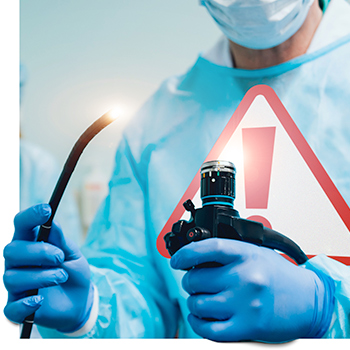
A colonoscopy is a risky but valuable procedure. The following guide from the attorneys at Janet, Janet & Suggs will help you learn about the risks associated with a colonoscopy and how to identify possible medical malpractice in the event that complications do arise from the procedure.
What Is a Colonoscopy?
A colonoscopy is an invasive procedure during which a long, flexible tube with a video camera is inserted into the rectum in order to investigate the colon and rectum. During the procedure, the doctor may also remove any polyps or take tissue samples for biopsy.
A colonoscopy may be routine, such as for older adults, or may be ordered when a younger patient is experiencing chronic symptoms. Doctors often recommend a colonoscopy for screening or diagnostic purposes:
- Identify causes of intestinal symptoms. Sometimes, doctors order a colonoscopy when a patient is experiencing diarrhea, constipation, rectal bleeding, abdominal pain, or other problems.
- Screen for colon cancer. Older adults at average risk for colon cancer may start receiving colonoscopies and other screening procedures, such as stool sample tests, around age 50.
- Follow up on previous procedures. Patients who have had colon polyps in the past may need more frequent colonoscopies to look for and remove additional polyps that may have formed in order to treat symptoms and reduce the risk of colon cancer.
When Is a Colonoscopy Needed?
With over 30% of the US population over age 50, it comes as no surprise that the number of colonoscopies performed each year stands in the tens of millions. While most people never experience complications from their colonoscopies, Baylor University Medical Center reports that complications are more likely to result when the healthcare professional is less skilled at the procedure. In some cases, these complications are caused by medical malpractice.
Colorectal cancer is the third-leading cause of cancer-related deaths in the United States, not including some skin cancers, according to the CDC. A colonoscopy is a procedure that can provide crucial early detection in the treatment of colorectal cancer and is generally recommended for adults age 50 and older every 5 to 10 years.
What Are the Risks of a Colonoscopy?
Endoscopic procedures—particularly those that require sedation, like colonoscopies—are inherently risky. Because of this, the standard of care can include physicians carefully weighing the potential benefits of the procedure with patients’ risk factors. According to the American Society for Gastrointestinal Endoscopy, one-third of patients report at least one minor adverse gastrointestinal symptom following a colonoscopy:
- Bleeding or hemorrhaging
- Infections
- Hypoxia
- Aspiration pneumonia
- Cardiac arrhythmia
- Abdominal pain or nausea
The risk of serious adverse events increases when the colonoscopy is specifically intended to perform a procedure, such as removing polyps or taking tissue for biopsy, rather than just for screening purposes. Patients with existing polyps also account for 85% of all serious colonoscopy complications.
Some of the risks of a colonoscopy include:
- Cardiopulmonary complications. Typically the result of sedation, patients are at risk for heart and lung events during or following a colonoscopy.
- Bowel perforation. Although rare, any point of the bowel wall may be perforated during a colonoscopy; this is much more common when performed by inexperienced healthcare professionals.
- Bleeding. Much more common during polyp removal, one risk of a colonoscopy is dangerous bleeding at the time of procedure or even weeks later.
- Infection. A 2008 review indicated that all reported cases of bacterial transmission resulted from either defective equipment or a failure to adhere to guidelines for cleaning reusable equipment.
- Abdominal pain. One-fourth of all recipients of colonoscopies report experiencing abdominal discomfort, which can be reduced by the use of appropriate technique on the part of the endoscopist performing the procedure.
- Splenic injury. Rare but serious, injury to the spleen can result in nonspecific abdominal symptoms even a month after the procedure, and delaying diagnosis may result in death.
- Death. Less than half a percent of colonoscopies result in death but, as with any procedure, especially those with sedation, it is a risk.
What Types of Colonoscopy Errors Result from Medical Malpractice?
While any violation of the standard of care may be considered medical malpractice, there are some common considerations and signs to look for if you or a loved one has experienced injury or complications after a colonoscopy:
- A lack of informed consent about the risks of the procedure, especially for high-risk patients
- A failure to diagnose or treat irritable bowel syndrome, polyps, or other concerns while or after performing a colonoscopy
- An attempt to pass the endoscopy through an obstructed part of the anatomy, resulting in injury
- A failure to provide adequate bowel preparation guidance
- A delayed or missed diagnosis after a colonoscopy resulting from negligence
- A failure to diagnose and treat colonoscopy complications in a timely manner
- A failure to recommend a colonoscopy when rectal bleeding or other symptoms consistent with colon cancer occur
- A lack of proper sterilization of endoscopes, which are used multiple times and can transmit bacteria from patient to patient
Colonoscopies are quite common, but serious complications are not. However, a team from Yale found that complications serious enough to require hospitalization often presented with unexpected factors:
- Serious complications affected nearly 2 percent of low-risk, healthy patients who received routine colonoscopies
- Injuries, complications, and infections were more present in some facilities than others, potentially indicating an issue larger than just one doctor’s mistake
- Many medical professionals believe colonoscopy complications are far less frequent than the research showed, meaning patients may experience delays in treatment
- Conditions that often require more frequent colonoscopies also increase risk, such as diverticulitis and inflammatory bowel disease
If you or a loved one believes you may have experienced or are experiencing complications as a result of colonoscopy errors, the first step is to seek medical attention. The next step is to consult with an experienced medical malpractice lawyer to review your situation. State rules about medical malpractice claims vary but, in general, a case must demonstrate the following to be considered malpractice:
- A patient-doctor relationship existed at the time of the injury
- The doctor was negligent and violated the standard of care
- The doctor’s negligence resulted in injury to the patient
The standard of care varies in each situation, but ultimately it is defined by what any reasonable, competent doctor would have done under the same circumstances.
Medical malpractice claims have statutes of limitations—laws that dictate how long you have to file a lawsuit—so it is important to speak to an attorney about your case as soon as possible.
How to Have a Safe Colonoscopy Procedure
While there is no way to guarantee a safer colonoscopy, there are some steps you can take to minimize your risks:
- Ask about your doctor’s experience and how many colonoscopies they have performed
- Make sure you are absolutely clear on the bowel preparation procedures—do not be afraid to ask multiple questions
- Check with your doctor or surgical center about the kind of equipment they use and how they sanitize it
- Have a plan for following up on any discomfort or pain you experience after the procedure
- Ask for documentation of any therapeutic actions taken during the colonoscopy, such as as removal of polyps, in the event that you need to seek follow-up care from an emergency room or urgent care center
- Make sure someone you trust knows you are undergoing the procedure and can check in on you, especially if you live alone
Why Choose Janet, Janet & Suggs for Your Colonoscopy Error Medical Malpractice Case?
Backed by both a strong record of helping to secure multi-million dollar settlements and verdicts as well as national recognition for our experience, trustworthiness, and compassionate representation, Janet, Janet & Suggs represents victims of medical malpractice nationwide. Because we operate on a contingency fee basis, we do not collect payment from you until we win your case.
If you or a loved one believes they may have grounds for a medical malpractice lawsuit as a result of a colonoscopy error, contact us to schedule a free, no-obligation consultation.

Reviewed by:
William R. “Topper” Cramer, RN, MBA, MS, CCRN, CFRN, EMT-P
Legal Nurse Consultant | Nurse Paralegal
Topper has been involved in emergency, transport, and critical care medicine since 1978 when he became an EMT in high school. A United States Air Force veteran, he remains active as a pre-hospital RN/paramedic, certified flight nurse, and critical care nurse. In addition to his professional role as a nurse consultant/nurse paralegal, he is the Chief of Operations at Walkersville Volunteer Rescue in Frederick County, Maryland. READ FULL BIO
